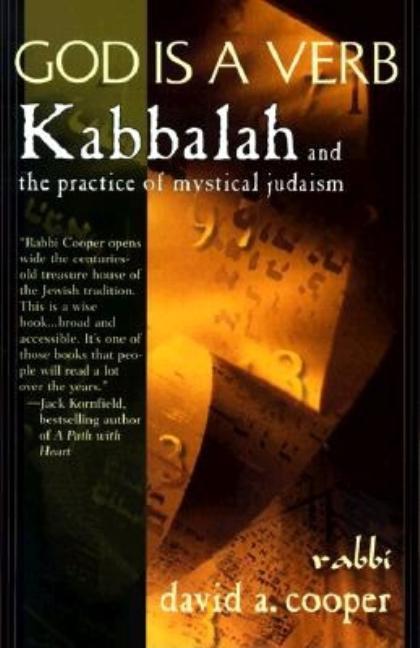God Is A Verb by David Cooper

Embraced by a multitude of notable individuals such as Madonna, Jeff Goldblum, and Elizabeth Taylor, and receiving extensive coverage in “Time” and “Entertainment Weekly,” Kabbalah is a mystical tradition within Judaism that has gained popularity among modern Western seekers, comparable to Buddhism. This groundbreaking book, written by the esteemed rabbi who created the highly-acclaimed audiotape series “The Mystical Kabbalah,” aims to introduce Kabbalah to a wide audience.
Receiving favorable reviews from critics, “God Is a Verb” has the potential to revolutionize Judaism similar to how “The Tibetan Book of Living and Dying” transformed Buddhism. By breathing new life into this ancient tradition, the book seeks to popularize its ideas among a fresh generation of spiritual seekers.
“The Mystical Path: Exploring the Universal God in Kabbalah”
In mystical Kabbalah, the traditional concept of God as a being with specific characteristics is challenged. Instead, Kabbalah views God as a boundless, formless presence that is constantly present and everywhere. This boundlessness is often described as a process rather than a noun, leading to the idea that God is a verb. In the Hebrew Bible, God identifies himself as “I am Who I am”, emphasizing the dynamic nature of divinity.
The term “God” itself is limiting, as the Torah actually uses many different names to represent the divine. Each name holds a different quality, which is often lost in translation to a singular word. This creates confusion about the true nature and characteristics of the divine. Kabbalah embraces the idea that everything, both good and evil, is under the same universal umbrella. This understanding is what gives Kabbalah its universal and inclusive character.
Kabbalah is not restricted to Jews alone, as it has been adopted and practiced by Christian theologians as well. It is a mystical aspect of Judaism, but any mystical tradition can find a place under the umbrella of Kabbalah. The term Kabbalah itself means “to receive” in Hebrew and refers to the practice of building a container to receive mystical teachings from the universe. As long as a person has the capacity to receive these teachings, they can be considered a practitioner of Kabbalah.
Authenticity is a key aspect of Kabbalah. It is not about ego trips or seeking personal power, but about feeling authentically connected to one’s practice. This can be understood as aligning one’s actions with the will of the divine, rather than pursuing selfish desires. It is important to recognize that there are different interpretations of what it means to be authentically Jewish or a rabbi, and the idea of authenticity may vary for different individuals.
Kabbalah challenges the notion of a historically specific God in Judaism. Kabbalistic teachings emphasize that the universal God is all-inclusive, and the historical God described in the Torah is just one aspect of this divine presence. The boundlessness and non-duality of Kabbalah can hold the duality and particularity of historical Judaism without conflict. This understanding allows for a more embracing and inclusive perspective, rather than getting caught up in arguments about whose God is the right one.
There have been historical arguments between different branches of Judaism regarding Kabbalah. Some more traditional and authoritative perspectives have criticized the mystical aspects of Kabbalah, seeing them as not authentically Jewish. These arguments and conflicts are inherent in most traditions, as the mystical aspects often challenge the status quo or established beliefs. However, mystics from different traditions often have a deep understanding and appreciation of each other’s experiences, recognizing a common mystical essence.
Kabbalah itself encompasses different traditions within it. Traditional Kabbalah involves the study and interpretation of sacred texts, such as the Torah, focusing on the numerical and symbolic aspects of the letters and words. On the other hand, ecstatic Kabbalah, pioneered by Abraham Abulafia, emphasizes contemplative practices and direct connection with the divine. In the modern context, Kabbalah can incorporate elements from different traditions and practices, as long as the fundamental goal is to quiet the mind and connect with the divine.
The discipline of Kabbalah involves self-reflection, meditation, and contemplation. It focuses on understanding our conditioned thinking patterns and beliefs, and learning to be present with the reality of each moment. While there are similarities with Buddhist practices, Kabbalah adds a Jewish perspective through the study of Torah and engagement with Jewish texts and teachings. Kabbalah also recognizes the interconnectedness of different traditions and seeks to bridge gaps and enhance understanding among various spiritual practices.
Kabbalah has political implications as well. It deepens our understanding of how our minds and conditioning shape our political views and actions. It encourages personal growth, maturity, and the ability to engage in dialogue and compromise, which are necessary in the political sphere. Kabbalah helps inform our political opinions and supports the development of a more well-informed and open-minded approach to politics and ethical concerns.







Leave a Reply